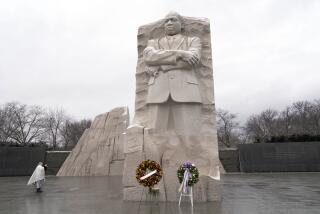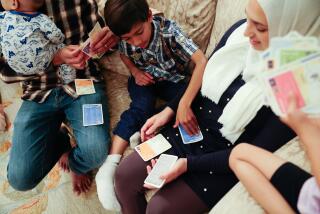Kwanzaa--the Festivities Continue : Culture: The celebration by many African-Americans goes on for seven days after Christmas and focuses on their roots and their community.
- Share via
Hanukkah has come and gone and Christmas will soon be here, but some Americans will still be lighting candles, sitting down to feasts and exchanging gifts well beyond Dec. 25.
For seven days starting Dec. 26, African-Americans in many cities will be observing Kwanzaa, a cultural festival that was designed in 1966 by Maulana Karenga, an activist and scholar. The word kwanzaa means “first” in the Kiswahili language, so Karenga borrowed the word for a celebration that means “first fruits.”
“This is not a black Christmas,” said Wekesa Madzimoyo, founder of Visions South Inc., in Montgomery, Ala., a multicultural education organization. “It’s not a religious holiday but a cultural holiday celebrating who we--African-Americans--are: our roots, our efforts and our mission to make our community healthy and whole again.”
Sequan Din, manager of the African-American Book Center in Chicago, said the festival is not based on African holidays but draws from African symbols and culture.
Chicago’s celebrations are rotated between area universities each year, normally drawing more than 2,000 people, according to Din. Even larger crowds are expected this year because of Kwanzaa’s 25th anniversary.
Atlanta also will have Kwanzaa festivals, said Dayo Olutosin, assistant at that city’s Shrine of the Black Madonna Cultural Center. The center’s bookstore sells a Kwanzaa kit--including a traditional straw mat, candles and candleholder--for $26.75.
Visions South in Montgomery recently sponsored a free pre-Kwanzaa celebration to teach families how to enjoy the holiday. Small, usually homemade presents are given on some of the days as a way of stressing certain principles, such as the importance of “cooperative economics.”
Karenga has assigned one of Seven Principles to each day of the holiday week. They are: unity ( umoja ), self-determination ( kujuchagulia ), collective work and responsibility ( ujima ), cooperative economics ( ujamaa ), purpose ( nia ), creativity (kuumba) and faith ( imani ).
“When you buy something, it is not as loving as when you make it,” said Margaret Davie, a popcorn shop owner in Montgomery. “Anybody can go to a shopping mall, buy a present and wrap it. But when you make something, you give it with your whole heart.”
During Kwanzaa, families set out cornstalks for each member plus an extra to symbolize hope for births of more children. Corn symbolizes the link between parents and children and the promise of future generations.
A new candle is added each night to a holder and is lit as each family member reflects on the principles of the day. The candles are red, black or green--the symbols of blood, skin and land.
“It’s a time for setting goals,” said Carolyn Caver Madzimoyo, Wekesa’s wife.


